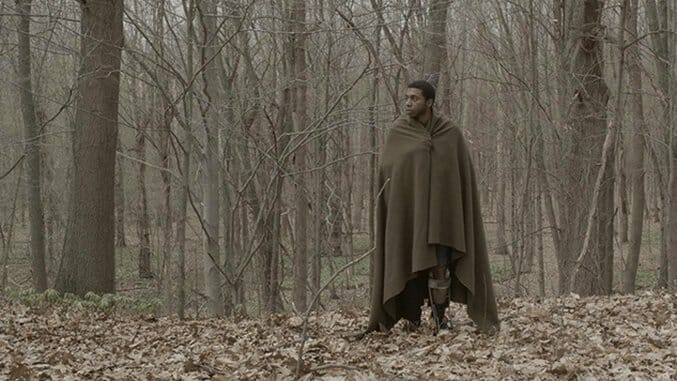The Alchemist Cookbook

About a third of the way into The Alchemist Cookbook, Sean (Ty Hickson) dares his friend Cortez (Amari Cheatom) to eat a can of cat food. Cortez takes him up on the challenge, and even though he clearly can’t stand the taste on his first bite, he tries his best to hide this from his friend and takes an even bigger batch for his second helping, only for him to finally give up soon after. This moment is not only one of the most hilarious scenes I’ve seen in a movie in quite a while, but it’s also a pretty good encapsulation of writer/director Joel Potrykus’s methods, with Cortez’s commitment to a blatantly ridiculous dare a miniature version of Potrykus’s own ruthless commitment to chronicling the strangest of human behavior.
The appearance of The Alchemist Cookbook on the cinema landscape certainly couldn’t be better timed, especially as a corrective to Jared Hess’s recent heist yarn Masterminds and Jim Hosking’s concurrently released horror comedy The Greasy Strangler. Both of those films offer object lessons in what happens when self-satisfied filmmakers prize ostensibly beguiling quirks and cheap shock tactics above anything resembling recognizable humanity. With Hess encouraging his performers to dial up the hick schtick to 11 and Hosking doubling down on the absurdist comedy routines, deliberately cheesy gore and unpleasant nudity at the expense of coherent characterizations, their films exude a condescension toward their characters that makes the experience of being an audience member unendurable in such soullessness.
Condescension is as far from Potrykus’s black-comic sensibility as one could imagine. That is not to say, however, that his oddball protagonists—Sean here, and the characters Joshua Burdge played in the director’s previous two features, Buzzard and Ape—are likable characters by any means. Buzzard centered around a slacker named Marty Jackitansky who made it a badge of honor to try to scam the capitalist system in his own small ways, and who spent much of his free time perfecting a Freddy Krueger-like “Power Glove” with knives sticking out of it. Never does Potrykus try to make this main character appealing any more than he lets Sean off the hook for his increasingly crazy behavior out in the woods. And yet, Potrykus’s films seem animated by a genuine fascination with his eccentric main characters: a sincere desire to dissect them, to understand them, to present them to us in all their unadorned loopy glory for either our amusement or disdain.
Potrykus’s directorial style is crucial to expressing this perspective. He’s not into the knowingly campy archness of the acting and cinematography in The Greasy Strangler or the blaring hamminess of the performances in Masterminds. Instead, Potrykus insists on realism, an approach he supports with an emphasis on long takes and stationary camera set-ups. Far from detracting from the surreality of the strange human behavior it depicts, this style simply reminds one of the crucial secrets to Luis Buñuel’s artistic success. As Dave Kehr once noted about the great Spanish filmmaker’s Simon of the Desert, he’s able to find exactly “how much realism is required in surrealism.”
-

-

-

-

-

-

-

-

-

-

-

-

-

-

-

-

-

-

-

-

-

-

-

-

-

-

-

-

-

-

-

-

-

-

-

-

-

-

-

-








































